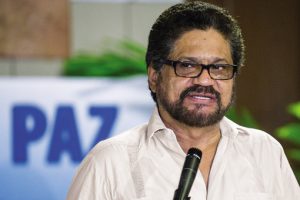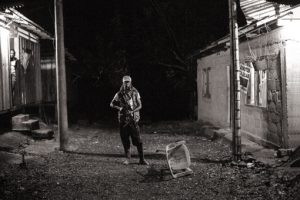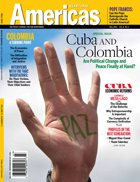Is the Western Hemisphere Ready for Ebola?
Over the past month and a half, the world has been challenged by the nimble Ebola virus, the latest outbreak of which has killed over 5,000 people. Even in the United States, a country with one of the best healthcare systems in the world, the Ebola virus infected two healthcare workers and claimed one life, … Read more
Peace in Colombia: Negotiating to Move On
On the afternoon of February 27, a bright and warm winter day in Cuba, the staff at the Hotel Nacional in Havana busily prepared for the arrival of former Brazilian President Luiz Inácio Lula da Silva, who was due to a give a talk to a group of business people that afternoon. Meanwhile, I was … Read more
Senator Rubio to Visit Colombia
Senator Marco Rubio (R-FL) will travel to Colombia today for a two-day meeting with Colombian government officials, businesses and civil society organizations to discuss security, trade and human trafficking, his office said Tuesday. Senator Rubio will be traveling to the South American nation in his capacity as a member of the Senate’s intelligence and foreign … Read more

Yes: Violence and Murder Are Decreasing in Mexico
When Mexican President Felipe Calderón left office in 2012, the nation’s war on the drug cartels had already claimed 60,000 lives. Now, two years into the presidency of his successor, Enrique Peña Nieto, security conditions are still far from praiseworthy, but have improved in several key areas. Homicides, the most reliable indicator for measuring public … Read more

No: Mexican Homicide and Crime Rates Remain High
As a presidential candidate, Enrique Peña Nieto promised “adjustments,” rather than any major changes, to the security strategy of the outgoing administration—and that is precisely what he has delivered as president. While there have been subtle—and not so subtle—shifts from the policies pursued by former President Felipe Calderón, there has not been a clear break … Read more

The Obstacles to Political Integration Post-Peace
After three years of negotiations with the Fuerzas Armadas Revolucionarios de Colombia (Revloutionary Armed Forces of Colombia—FARC) Colombian President Juan Manuel Santos has decided to go all-in on securing peace for his country. His political and personal commitment became clear earlier this year when he staked his entire campaign for his second term in office … Read more

The ELN’s War
The recent 50th anniversary of the Ejército de Liberación Nacional (National Liberation Army—ELN) led journalist Ramón Campos Iriarte to the jungles of Colombia’s western Chocó province, where open war between guerrillas, government forces and paramilitary groups has been escalating. The ELN—self-defined as a Marxist-Leninist organization influenced by liberation theology—was created on July 4, 1964, in … Read more
Bolivian Ombudsman Denounces Increased Violence Against Girls
Bolivian Ombudsman Rolando Villena voiced his alarm yesterday at the recent uptick in sexual violence against women, and particularly young girls, in the wake of the rape and murder of a four-year-old girl last week in the town of Palos Blancos. This attack follows the death of a five-year-old girl in the Cochabamba region who … Read more
What Next, Canada?
As the dust slowly settles on last week’s terrorist attacks in St. Jean, Québec and the Canadian Parliament in Ottawa, it may be a good time to assess the fallout. Overall, Canadians did not panic, and responded with compassion and moderation. The Canadian media avoided the sensational, and stuck to a balanced and thoughtful coverage. … Read more
Gulf Cartel Leader in Federal Court
Juan Francisco Sáenz-Tamez, the 23-year-old head of Mexico’s Gulf Cartel, has made his first court appearance, the U.S. Department of Justice announced on Tuesday. Sáenz-Tamez was arrested by federal officials in Edinburg, Texas on October 9 and faces life in federal prison if convicted of drug charges. Sáenz-Tamez was arrested on charges of money laundering … Read more
Dealing with Terrorism in North America
Author’s note: Following the Boston shooting in April 2013, I wrote about how North America would continue to face the threat of domestic terrorism. Yesterday, Canada’s Parliament was assailed by what is described as a “lone wolf” gunman. This was the second attack in a week, and Canada has lost two soldiers to the violence. … Read more

Hard Talk
Is Mexico’s security situation improving? Yes: Eduardo Guerrero; No: Alejandro Hope

Cuba and Colombia
Articles: published article?1 A Skeptic’s View on the “Peace Dividend” by Alberto Bernal The economic benefits are neither direct nor certain. The Obstacles to Political Integration Post-Peace by Juanita León The obstacles to political integration. Full text available. Law and Reconciliation in Colombia by Rodrigo Uprimny Yepes and Nelson Camilo Sanchez Here’s how to achieve … Read more
Anti-Riot Police Sent to Guerrero After Protesters Set Fire to Government Palace
On Monday, hundreds of demonstrators protested at the Palacio de Gobierno (Government Palace) in Chilpancingo, in the Mexican state of Guerrero, demanding that the government take further action to locate the remaining 43 students that went missing on September 26. The demonstrators called for the resignation of Governor Ángel Aguirre, vandalized various government buildings and … Read more
Obama’s Request and Canada’s Decision
Resisting the rush to war has been a characteristic of the Obama administration since its election in 2008. Avoiding the Bush-Cheney approach, which led to the Iraq invasion in 2003, Obama has been criticized for indifference, detachment and sometimes weakness in dealing with international crises. Even former Secretary of State Hillary Clinton and former Defense … Read more


